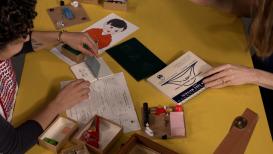On Intelligence Tests employed multi-disciplinary tools and artistic research methods to critically examine the aesthetic, material, and affective power of historical intelligence test kits and their capacity to be performing objects. The specific objects of study, the Wechsler and Stanford-Binet tests, were devised in the United States to assess children and adults in various institutional settings, including classrooms, courtrooms, and immigration centers. Since the inception of these tests, concepts of measurable intelligence and IQ testing have infiltrated culture. Given the material qualities of the tests, though, artistic methods are uniquely apt at addressing materiality, affect and theatricality. The tests themselves are constituted of boxes of many kinds (briefcases, wooden and cardboard boxes) and the toys, puzzles, booklets, and forms that they contain. They also contain an affective aura, which arises from the combination of the meaning and uses of the tests and the multi-sensory materiality of the objects.
Three primary artistic projects drove the historical and theoretical endeavor forward. First, the tests were displayed in an interactive sculptural desk alongside material antecedents and precedents to testing (toys, for example, that came before the tests, and ones that appeared afterwards), prompting play, discovery, and interaction with visitors. Second, the tests were featured in blended commercial and museological photography which framed them as products and as archival objects at once. Finally, the tests were put into action in a theatrical setting, wherein actors experiment at performing with the tests. In the end, On Intelligence Tests picked up the testing kit and recontextualized it through artistic modes, ‘opening up’ the kit both figuratively and literally, documenting and exhibiting it, playing with it, and putting it into theatrical performance as a multi-modal method for getting to know objects from psychology in ways that they have not been understood before.

